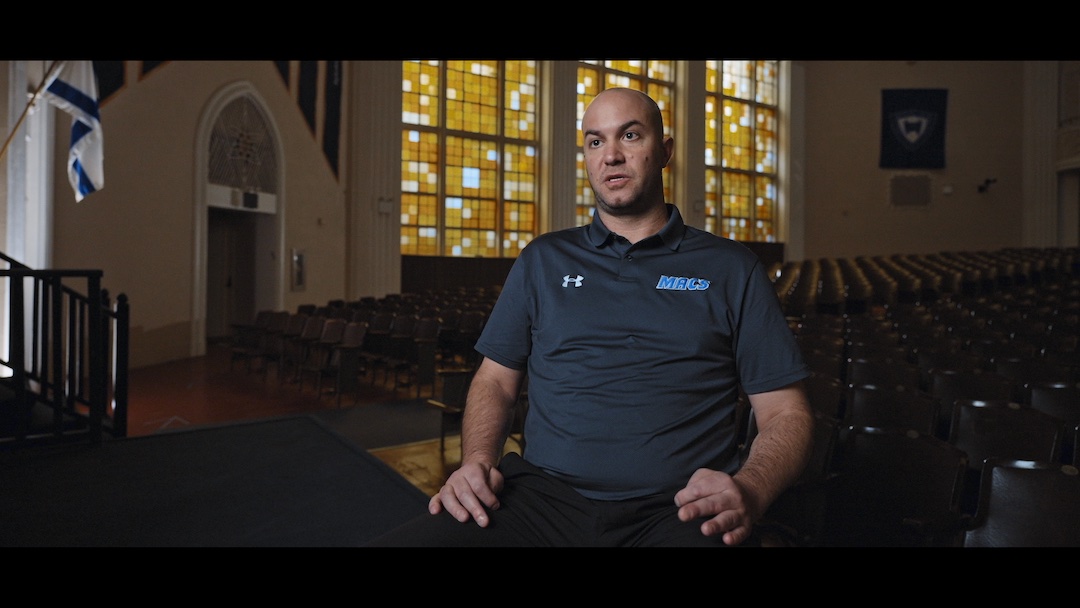This article was produced as part of the New York Jewish Week’s Teen Journalism Fellowship, a program that works with Jewish teens around New York City to report on issues that affect their lives.
“We’re not just a Jewish team but we are playing for the Jewish people.”
So says Zevi Samet, a junior guard for the Yeshiva University Maccabees, a NCAA Division III men’s basketball team, who is slightly out of breath after running laps around the court with his teammates.
Samet is one of the subjects of “Rebound: A Year in Triumph and Tragedy at Yeshiva University Basketball,” a documentary now streaming on Fox Nation.
The film, directed by Pat Dimon, follows the team in the year following Oct. 7, 2023, when the Maccabees were challenged with balancing their grief and anxiety surrounding the tragedy in Israel with competing in the NCAA conference.
“There is often a perception that Jews are more into academics and business,” Julia Mann, an associate producer of the film, said. “But the film highlights a different side of Judaism, and shows that Jews can play sports and have fun on the court just like everyone else.”
The film follows the Maccabees in the 2023-2024 season as the aftermath of Oct. 7 and the global rise in antisemitism unfolds before their eyes. At the heart of it all is head coach Elliot Steinmetz, who began coaching the Maccabees in 2014 and led the team to a 50-game winning streak from November 2019 to December 2021.
In the documentary, Steinmetz lays bare the team’s challenges and resilience after October 7. As he says in the film: “We wanted to have a season but we wanted it to have more meaning than just basketball.”
Recently, the New York Jewish Week spoke to Steinmetz about the making of the film, what changed for the Maccabees following Oct. 7 and about how he created an environment to help the men’s basketball team thrive.
This interview has been lightly condensed and edited.
New York Jewish Week: Why did you agree to participate in the film?
Steinmetz: That’s a great question because it wasn’t a simple process. After Oct. 7, we had a lot of media reaching out and a lot of people who wanted to do different articles, even places like ESPN. I was talking to a few of my players, and I was really very against doing anything because I just thought it was too raw and it was the wrong timing. You know, why are we putting a basketball team in the spotlight when so much is going on in Israel? But after speaking with one of my partners at work, I was convinced to do something. I realized it would be stupid to pass up this opportunity because of the positivity it could spread. The concept that showing this positivity and having a platform to speak out for the IDF and hostages is something that we shouldn’t be passing up on.
How did you feel about a non-Jewish film maker telling this story?
I think it’s great. Pat [Dimon] has been awesome and he really fit in with us right away. His sensitivity towards everything that was going on and his ability to recognize the emotions of everyone on the team was super helpful. He knew when to back off if they needed it, which didn’t really happen, but I think that willingness was something our guys really appreciated and got comfortable with. So, I think the fact that he was not Jewish made no difference. He’s just a good person who wanted to help get a message out in a certain way and kind of tell the story of what is going on, especially with everything going on in American college campuses.
What was coaching like before and after Oct. 7?
It changed dramatically post-Oct. 7. I think there are points in history where life moves on, or there’s a before and after. The Holocaust was probably like that and for Americans, after 9/11 it was like that, too.
The same went for Oct. 7. There was life before and life after. Of course, before Oct. 7, we focused on fighting antisemitism and it was a major part of our message, but we were mostly about basketball and making a name for ourselves. But after Oct. 7, it became a totally different animal.
The wins and losses did not come nearly as important as what was going on off the court. The fact that we were able to win games and be successful allowed us to have a platform and that kind of became the driving force behind our season.
So, yes, a lot of things changed. Israeli players were constantly hearing from family about either somebody getting called up to the army, or a rocket attack in their area, or news about maybe a hostage or somebody who was missing. And so, we had to write up a way to cater to those emotions in a certain way, and it wasn’t even a question.
We allowed our players to have their phones at practice, to go off and check their phones when they wanted to. It was honestly a general understanding that everyone, Israeli or not, everyone was kind of going through a trauma that was way bigger than what we were doing basketball wise
Do you feel the film accurately portrays the triumphs and challenges the team faced in the months after Oct. 7?
I was blown away when I watched it. I’ve never been in a documentary or film before, so to get to see everything come together was amazing. Of course, I sat for my interviews and was at the games. But I wasn’t at any of my player’s interviews, and the moments that they were on their own, whether it was in the locker room, going for a meal, or even in their dorms, and to see how they react to things, answer questions, and just how they handle themselves is so impressive. It gave me real hope for the next generation. Not only are there kids who know how to think but also know how to be mature and approach major adversity. Not only that, but I also learned so much from my guys. I always knew that they were all amazing kids but I felt reinforced about the fact that I really brought good kids here.
The New York Jewish Week brings you the stories behind the headlines, keeping you connected to Jewish life in New York. Help sustain the reporting you trust by donating today.





